Members of Unite the Union at the Rolls-Royce factory in Barnoldswick, Lancashire have saved their jobs — and the economy of their local community — through aggressive struggle, including nine weeks of strike action.
Continue readingueintl
2020 International Labor News in Review
The Good
Bolivia
In October, the Bolivian people elected Luis Arce to be their president, ending the brief reign of a far-right government installed by a military coup and backed by the Trump administration. UE’s officers condemned this coup last November.
Arce has won so decisively that his closest competitor, a former right-wing president, conceded the race within a day of the election. This is an important victory for the workers of Bolivia and for the democratic process. The current government repeatedly delayed new presidential elections. The lack of respect for democratic self-rule brought workers into the streets, including a general strike in August that lasted more than a week. Workers demanded free elections, despite the pandemic. They were finally able to go to the polls October 18.
Luis Arce served as the economy minister under Evo Morales, an indigenous leader who served as Bolivia’s president for 12 years. Arce represents the same political party, the Movement Towards Socialism (MAS). Under Morales and Arce’s leadership, Bolivians saw their standard of living increase and poverty decrease, according to the Center for Economic and Policy Research. Their administration championed improving the lives of working people, many of whom live in rural areas. For example, rather than allowing corporations and the wealthy to profit from Bolivia’s natural resources, they used revenue generated from their natural resource wealth to provide free health care to all.
The intervening 11 months of rule by military coup resulted in massacres of indigenous civilians and politically-motivated prosecutions of MAS supporters. While no country has been spared the ravages of COVID-19, the current government’s botched handling has resulted in an incredibly high mortality rate.
Arce has admitted that it will not be easy to undo the economic downturn that began prior to the pandemic and has been exacerbated by it. Nevertheless, Bolivians can take heart that a democratically-elected leader will be at the helm, navigating the present situation with the best interests of working people in mind.
Chile
In October, voters in Chile overwhelmingly approved the idea of writing a new constitution for their country. They won the right to hold this election through mass street protests and strikes over the past decade.
Chileans also overwhelmingly agreed that those who write the next constitution should be elected for that purpose, rather than being written by politicians who are already in office. In April 2021, they will return to the polls to elect 155 people to the constitutional convention. They expect to vote on a new constitution in 2022.
Though there is clearly more work to do to ensure a new constitution will represent the interests of working people, the election sends a strong message that Chileans are ready to discard all remnants of the military dictatorship of Augusto Pinochet. Under Pinochet’s violent government, which formally ended in 1990, labor rights were severely limited, and trade unionists were regularly “disappeared” by the military. During the military dictatorship, UE members took numerous international solidarity actions to support Chilean workers.
The Bad
Alberta, Canada
In Alberta, Jason Kenney’s UCP government is actively rolling back workers’ rights. In the midst of a pandemic with rising case numbers, Kenney has blatantly attacked public health care and education, causing chaos and prompting health care workers to conduct wild cat strikes.
On November 5 he introduced yet another attack on Alberta’s workers through sweeping changes to the province’s health and safety laws.
The devastating bill seeks to amend the Workers Compensation Act and replaces the Occupational Health and Safety Act in its entirety—making it harder to track and review the full impact of amendments.
“There is no jurisdiction in Canada where workers have too many health and safety protections,” said Jerry Dias, Unifor National President. “Every time a government slashes legal safeguards for workers, there are tragic consequences.”
The most noteworthy amendments include limiting the right to refuse unsafe work, capping the amount seriously injured workers are eligible to receive, and eliminating an employer’s responsibility to reinstate injured workers.
“Because of COVID-19, workers in many sectors are more vulnerable on the job as they’ve been in decades, with new health risks and less bargaining power. If this bill passes, Alberta’s workers will have even fewer rights under the law,” said Gavin McGarrigle, Unifor Western Regional Director. “We knew Jason Kenney was in the pocket of powerful employers. But attacking health and safety during a pandemic is a new low, even for him.”
But Alberta workers are fighting back, and Kenney is likely to see more resistance in coming months.
India
The right-wing government of India has passed a series of so-called “Labour Codes” that do more to expand rights for businesses than to protect workers.
The new regulations give flexibility to employers at the expense of workers’ rights to a safe workplace, to social security, and to have a recognized union. In the midst of workplace changes that have already vastly expanded the number of precariously employed workers, these laws have made it even easier for bosses to fire workers or close up shop with little notice. Much like our own US labor law, these codes exclude the huge numbers of agricultural and domestic workers, the overwhelming majority of whom are women. The clear result of these laws will be further exploitation of working people for the sake of profit for a few.
Japan
In August, Japanese Prime Minister Shinzo Abe stepped down under mounting pressure from union and peace activists and amidst poor handling of the pandemic, though he used his own health as an excuse.
Unfortunately, he has been replaced by Yoshihide Suga, who seems to be even worse for working people. He has committed to easing regulations for businesses. He has said Japan will not sign onto the United Nations’ Nuclear Weapon Ban treaty, despite Japan being the only country to experience attacks by atomic bombs. He is set to allow the release of treated radioactive water from the damaged Fukushima Daiichi nuclear plant into the ocean.
Meanwhile, suicide rates are rising in Japan amid the pandemic-related economic downturn. Suga’s government has yet to commit to a plan for expanded social services to ease the suffering of working people.
Philippines
Rodrigo Duterte, President of the Philippines, has used the pandemic to continue his attacks on labor and human rights activists. Over the summer, labor and peace activists were detained and even murdered by his regime.
The right-wing government has invested $19 billion in the so-called “National Task Force to End Local Communist Armed Conflict,” a military led organization that is tracking and intimidating activists and labeling them communists, regardless of their ideological affiliations. The government is using this task force to prevent democratic worker organizing and critiques of the Duterte administration. Unions and other working class organizations have decried spending public money on this politically-motivated task force rather than investing in pandemic relief, or in aid to communities devastated by a recent typhoon.
Colombia
Colombian trade unionists continue to face violence and threats of violence for advocating for labor rights and the protections of public services, like education. On October 26, death threats were sent to all 15 members of the Executive Committee of the Colombian Federation of Education Workers, as well as to the President of the Trade Union Confederation. The threats took the form of a funeral wreath with the words “rest in peace.”
Mixed
USMCA/NAFTA 2.0
The new US Mexico Canada Agreement (USMCA), the replacement for the free trade agreement previously known as NAFTA, became law July 1, though it will take several months before many portions can be enforced. The new deal remains a tool for corporate interests and provides insufficient relief to address the problems for working people embedded in the original agreement. At their core, these trade agreements serve to guarantee corporate investments in foreign countries and stop elected governments from passing measures that might impact corporate profitability while offering no real guarantees to workers in exchange.
Belarus
In early August, Belarussians went to the polls to participate in a rigged presidential election. Current president Alexander Lukashenko, in power since 1994, refused to allow many opposition candidates to participate in the election.
Tens of thousands of protestors have gathered in the streets every week since the election, including sporadic strikes. However, these workplace actions have lacked coordination, in part because there aren’t strong, independent trade unions. As of early November, Lukashenko had yet to concede any power, refusing to even enter into dialogue with opposition groups.
Mexico
In 2019, Mexico secured a host of new labor rights, including secret ballot union elections and more fiscal transparency requirements for unions. UE’s ally in Mexico, the Frente Autentico del Trabajo (FAT) applauded these new measures.
Unfortunately, there are already concerns that Mexico is not upholding these new labor rights, some of which were also requirements under the USMCA. Several labor activists were arrested for their work this summer, including a leader of the FAT in Nayarit state. While they have subsequently been released, the message of worker intimidation was clear. Additionally, the implementation of other rights was slowed by the coronavirus pandemic.
Despite many challenges from corporate-backed politicians in opposition parties, Mexico’s new president, Andres Manuel Lopez Obrador (known as AMLO), continues to push for reforms that will benefit working people. This included an increase to the minimum wage in January, and providing direct cash payments to the poor.
Unifor Members Strike for Improvements in Retail Sector
(St. John, Canada)— Workers at Dominion grocery stores across the province of Newfoundland, members of Unifor Local 597, ratified a new collective agreement on November 13, ending a 12-week long strike action at stores across Newfoundland.
Continue reading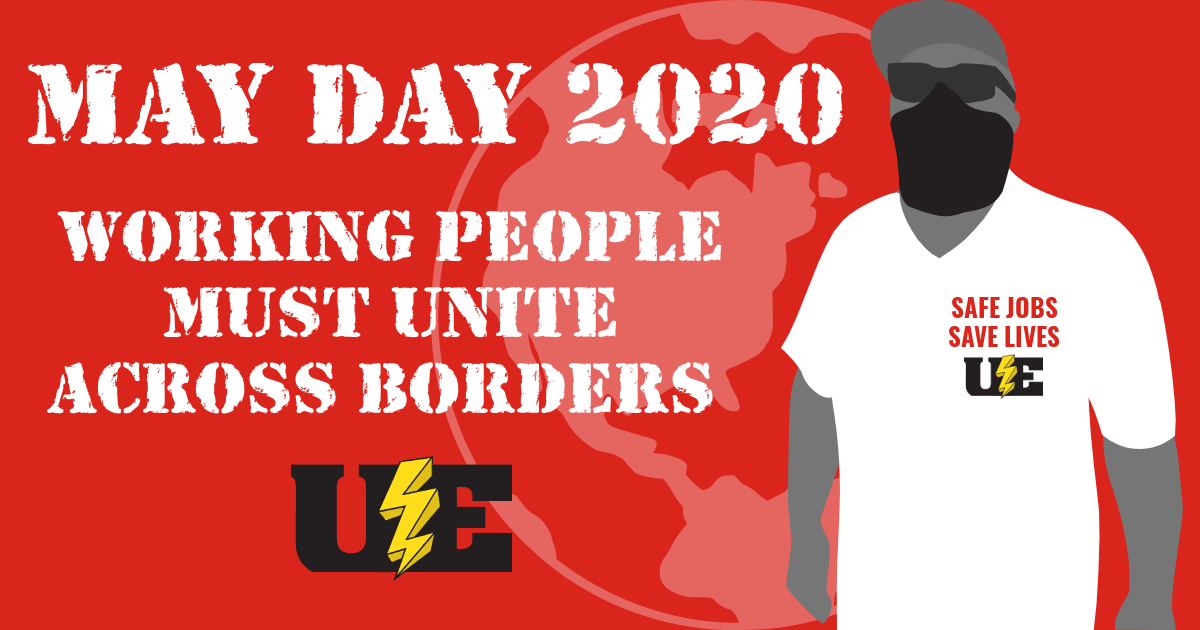
May Day 2020: Working People Must Unite Across Borders
This year, we celebrate International Workers Day as the novel coronavirus/COVID-19 pandemic has made clear the central importance of workers to our society. It is the labor of frontline workers — healthcare workers, grocery and food workers, sanitation workers and others — that is keeping people alive right now, not the wealth accumulated by capitalists.
Continue reading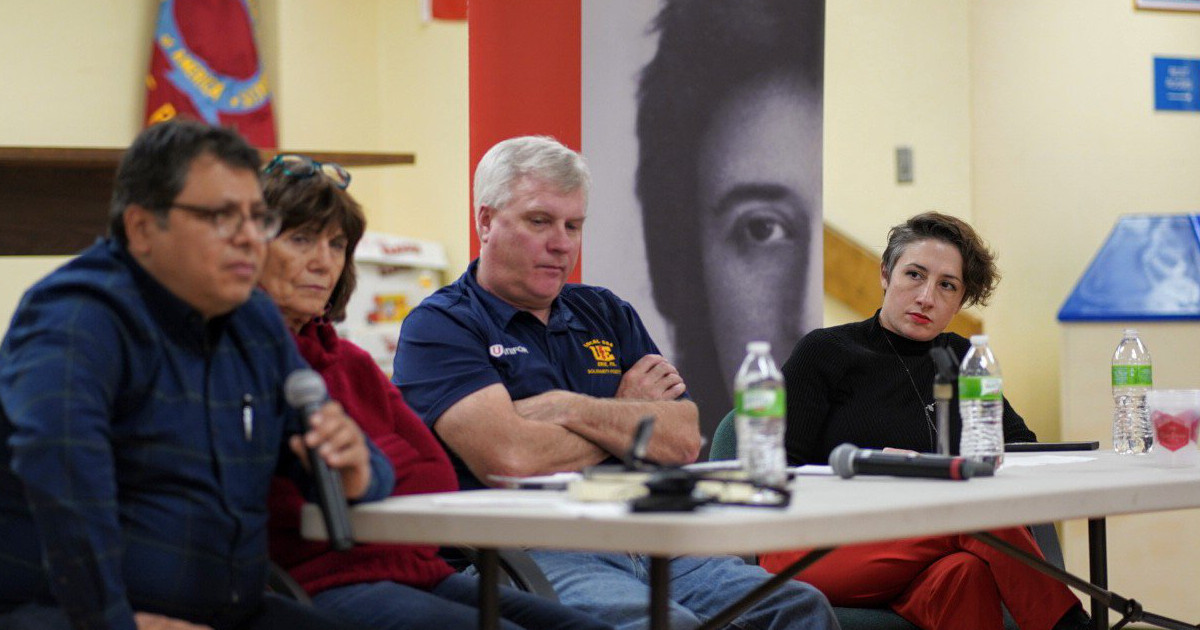
International Solidarity and Collaboration in Erie
In November, UE Local 506 hosted a tri-national labor solidarity gathering at their hall in Erie, PA. The event, entitled “Overcoming Fear: Creating a Trinational Workers Toolkit,” was organized by UE’s Director of International Strategies Kari Thompson, the Rosa Luxemburg Stiftung, and the Canadian Steelworkers. Participants gathered from across Mexico, Canada, and the US, including UE allies from the FAT and the CSN. Members of the Local 506 Executive Board participated in the two-day event, as did Young Activist Sarah Vukelich, Local 150.
Continue reading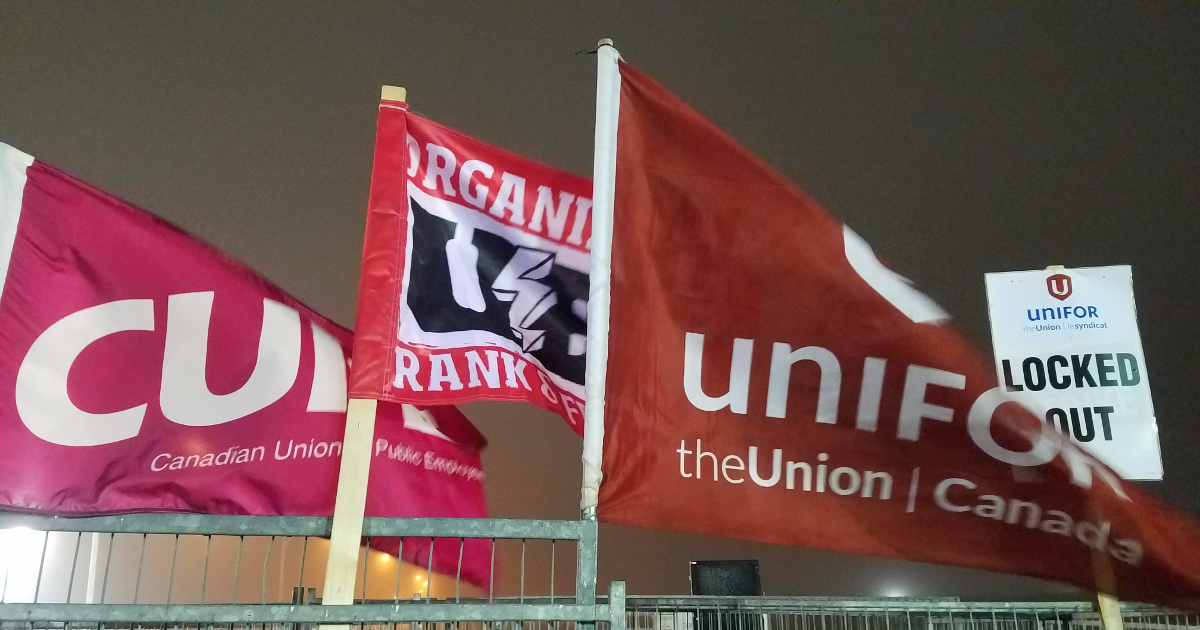
Solidarity with Refinery Coop Workers Fighting for Democracy and Power for All Workers
UE’s officers sent the following letter of solidarity today to Unifor Local 594, whose members have been locked out for 64 days.
Kevin Bittman, President, Unifor Local 594
As the shameful lockout of Coop Refinery workers in Regina, Saskatchewan enters its tenth week, UE reaffirms our full solidarity with Unifor Local 594. The very right of workers to have an organized voice and a say in their workplaces is at stake in this dispute. We are encouraged by the solidarity shown to Local 594 by their national union and the rest of the Canadian labor movement, and we encourage all US unions to close ranks with our brothers and sisters in Canada to defeat this attack on our rights.
Federated Coop Limited (FCL), which owns and operates the Coop Refinery, has avoided their obligations to bargain with Local 594 by enlisting the police force and the government to break the union. Nineteen workers have been arrested over the last three weeks, including members of Unifor’s leadership team and the locked-out local union, many for simply picketing on the sidewalks they were forced onto by their employer.
The purpose of government involvement in labor disputes should be to maintain balance in the process of bargaining, and to provide for peaceful resolution of disputes.
FCL built scab camps inside the perimeter well ahead of bargaining and has been helicoptering scabs in. Recently, they cynically took advantage of a good-faith attempt by the union to get back to the negotiating table. When Unifor suspended their blockade and made a generous offer to resolve the dispute, FCL merely demanded further takeaways at the table while moving scabs and oil trucks in and out the facility. These are not the actions of a company interested in reaching a fair negotiated agreement with its workers.
This is what happens when employers feel like they have free reign to prolong labor disputes by employing scabs and using heavy-handed legal and police tactics against the union. We join Unifor in calling for the government to appoint a mediator with power to assign binding arbitration if parties fail to come to an agreement. We also urge provincial, state and federal governments in both of our countries to pass anti-scab legislation to prevent these kinds of disputes in the future and restore workers’ rights to engage in meaningful collective bargaining with their employers.
This struggle is not simply about refinery workers in Regina, it is about democracy and power for all workers. Solidarity forever!
In solidarity,
Carl Rosen
General President
Andrew Dinkelaker
Secretary-Treasurer
Gene Elk
Director of Organization
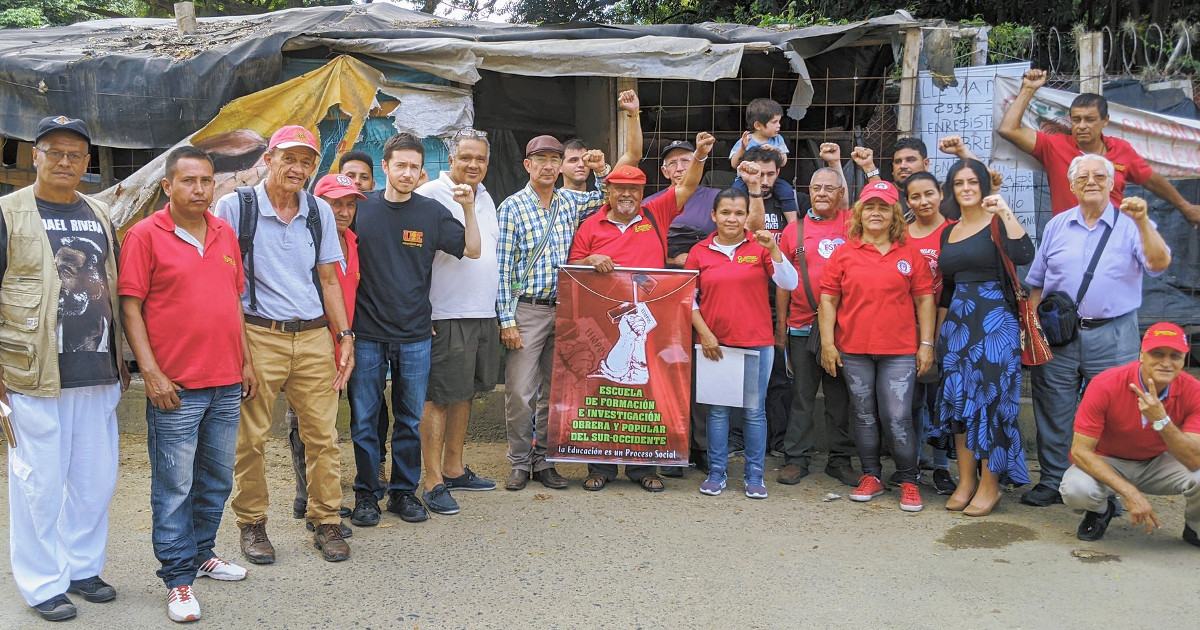
Colombian Workers Fight Anti-Worker Economic Policies, Despite Repression
From November 24th to December 4th, 2019, United States Labor Against the War (USLAW) and the Alliance for Global Justice (AfGJ) led a joint labor delegation to Colombia. The delegation was timed to coincide with the third anniversary of the signing of the peace accords that ended more than five decades of war between the Colombian state and the Revolutionary Armed Forces of Colombia – People’s Army (FARC-EP). Participants included union members and staff from UE, National Nurses United, UNITE HERE, the International Union of Painters and Allied Trades, the United Steelworkers, and the National Writers Union. The delegation also included a member of About Face: Veterans Against the War and Latin America solidarity activists. Continue reading
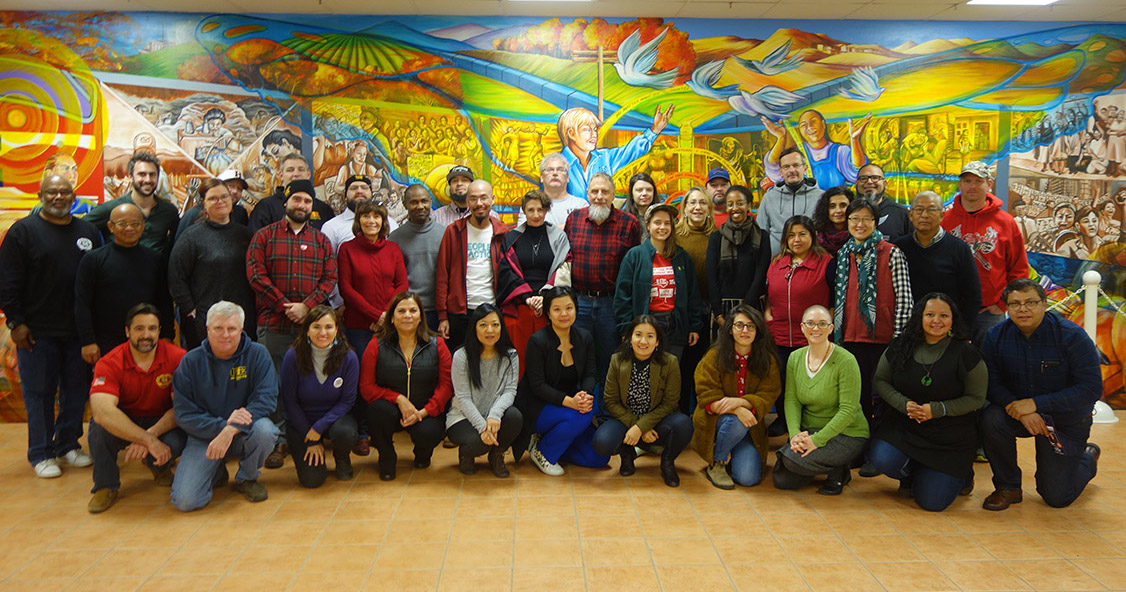
A Year of Challenging Capitalism, Militarism and Nationalism
Here at the UE Research and Education Fund, we’ve done a lot this past year to deepen UE members’ understanding of the world through international solidarity with workers from other places. We look forward to continuing this work to challenge capitalism, militarism and nationalism in the new year.
Continue reading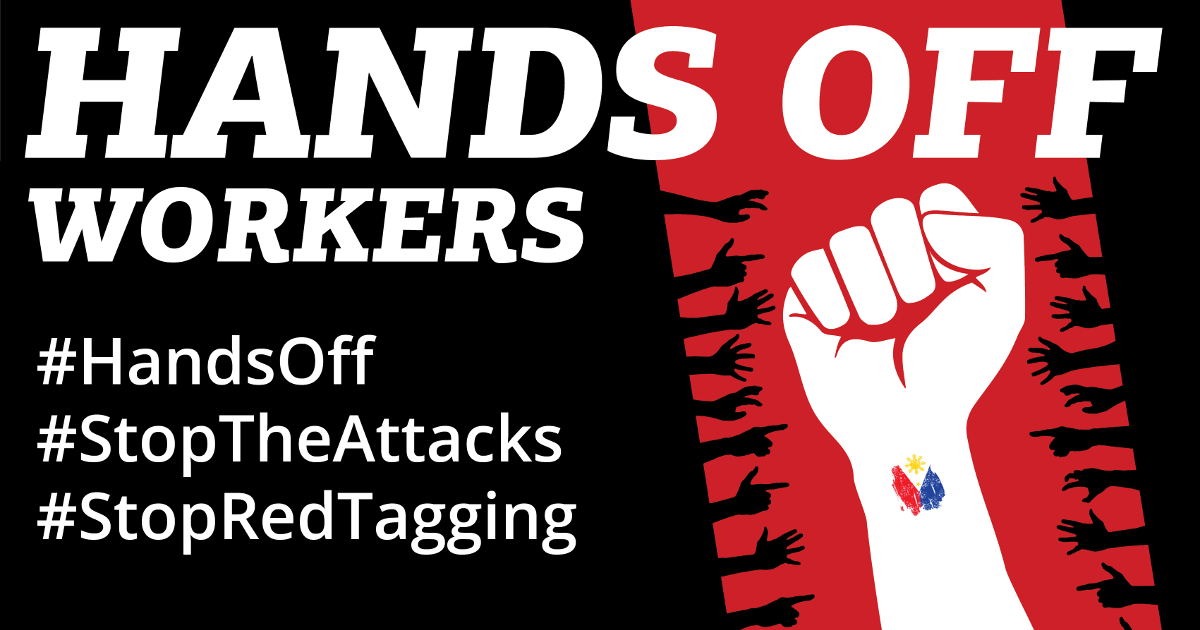
UE, Global Unions Take Action Against Violent Repression of Trade Unions in the Philippines
On Human Rights Day, December 10, UE joined hundreds of other unions throughout the world in taking action to support the working people of the Philippines, where trade unionists and activists are facing increasing repression and violence. Continue reading
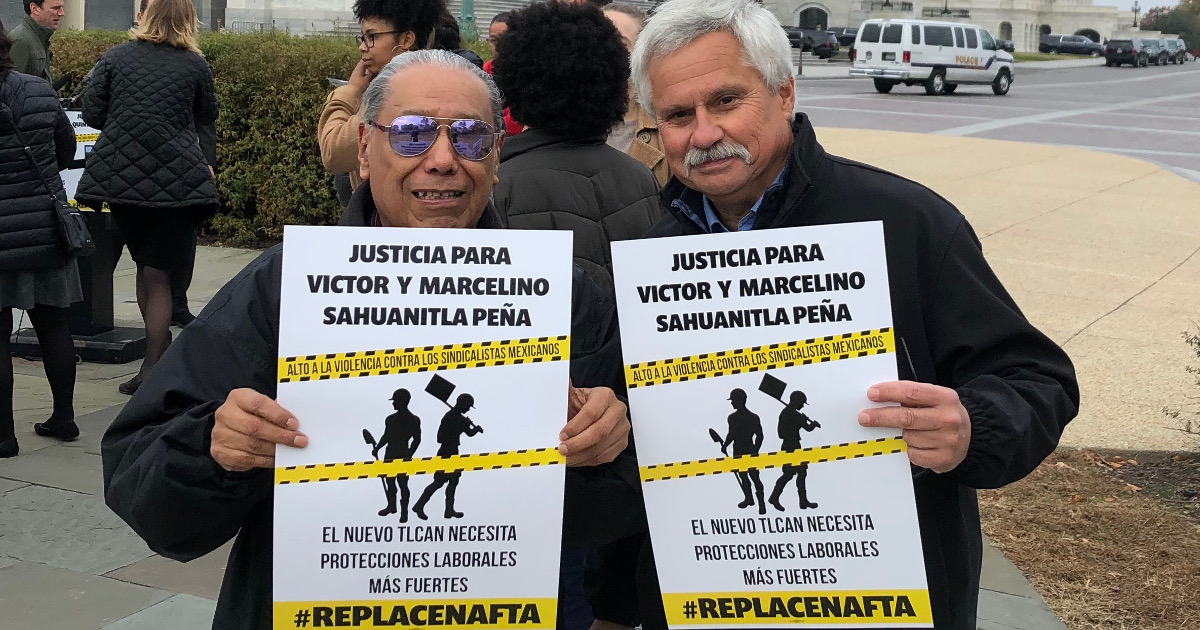
UE Allies Demand Justice for Mexican Unionists Murdered During NAFTA Renegotiations
(Washington, DC)— Retired UE Director of Organization Bob Kingsley joined labor rights activists at the U.S. Capitol on Wednesday, November 20 to demand justice for recently murdered Mexican unionists, and that labor-rights provisions in the renegotiated NAFTA 2.0 be strengthened before it is sent to Congress.
Continue reading